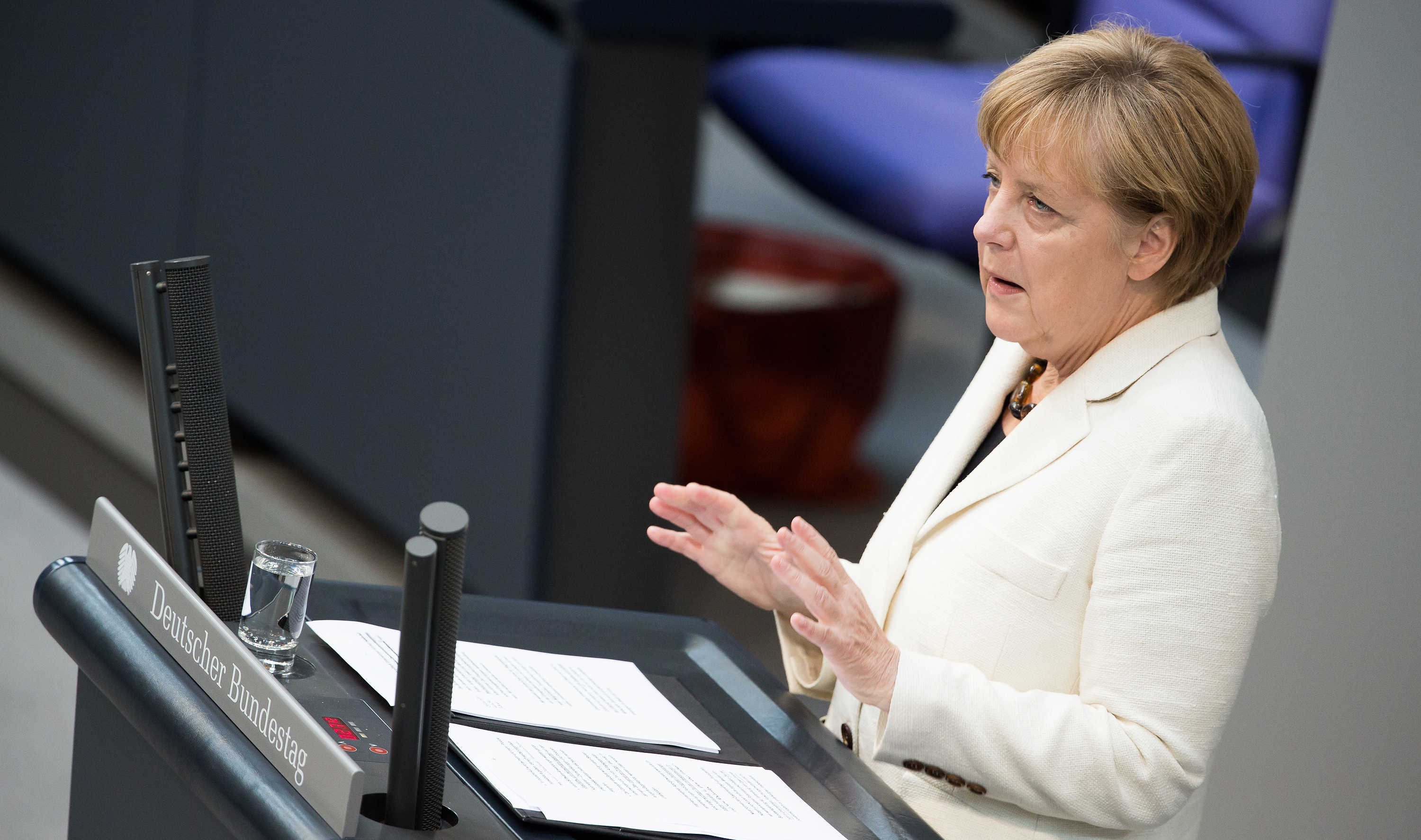Pacifying internal critics
On December 6 and 7, 2016, Germany’s centre-right CDU congregated in Essen for its party convention to endorse Angela Merkel for another term as CDU chairwoman as well as for a fourth run for Chancellor in the September 2017 federal elections.
Merkel had announced her decision to stand again for both offices shortly before the convention. Manifestly, shee deemed the moment to be an opportune one: her popularity ratings had steadily improved over the past weeks as she shifted to a more restrictive position on immigration that sought to reassure a fearful electorate and – after a series of defeats at the polls – to pacify her internal detractors.1
At the party convention, Merkel continued her attempts to win over her critics on the right by asserting that the open-door approach to immigration that she had taken in summer 2015 “cannot, should not, and must not repeat itself.” She defined a harsher line on immigration as “our and my declared political goal.”2
A set of restrictive measures on immigration and identity
The party convention endorsed the creation of “transit zones” for newly arriving migrants at German borders. These are to function as centres for reception, shelter, and detention where immigrants’ demands for asylum are processed on the spot. Moreover, the CDU aims to quicken the deportation of asylum-seekers who have had their demands rejected.3
Islam and immigration loomed large behind some of the other proposals adopted at the convention, too. Merkel herself demanded that the burqa be banned “wherever this is legally possible.” As a piece of clothing making face-to-face communication in a democratic society impossible, Merkel defined the burqa as alien to German culture and values.4
Moreover, the convention demanded that marriages involving an underage bride or groom concluded abroad be no longer legally recognised and valid in Germany. On this issue, the run-up to the convention had witnessed repeated public polemics.5 Finally, in another measure of identity politics, German is to be inscribed in the constitution as the country’s official language.6
Conservative revolt on dual citizenship
However, these concessions did not satisfy the CDU’s conservative wing. While Merkel was re-elected to the chairmanship, she only received 89.5 per cent of the votes – a weak showing given the traditionally consensus-based and largely ceremonial nature of personnel choices at CDU party conventions. It represented Merkel’s second-worst result in her sixteen years at the head of the party.
Moreover, the CDU’s youth wing pushed through a resolution proposing a tightening of citizenship laws. Since late 2014, children of non-EU immigrants (above all from Turkey) who have been born and raised in Germany are allowed to retain both the German nationality and the nationality of their parents. The convention adopted a motion that seeks to scrap this option for dual citizenship and to force children to choose between a German passport and the passport of their parents’ country of origin by the age of 23.
This proposition targets over half a million children and young adults born between 1990 and 2012. Conservative politicians such as Jens Spahn, young CDU hopeful and self-stylised ‘burqaphobe’7 have long lambasted rules allowing dual citizenship as diluting immigrants’ loyalty to Germany.8
The CDU’s strategic choices
Merkel and the CDU leadership subsequently stated that they would not consider themselves bound by the convention’s decision on dual citizenship. Interior Minister Thomas de Maizière asserted that while he remained sceptical of dual citizenship per se, retracting the more liberal regulations would needlessly hurt and antagonise the young people targeted. In any case, none of the CDU’s potential coalition partners for a post-2017 government is willing to accept a crackdown on dual nationality.9
Thus, while the arduous discussions on citizenship provisions will remain largely inconsequential for the foreseeable future, they nevertheless show the dissatisfaction of the conservative base: the CDU party convention – occasionally ridiculed by political opponents as a powerless body rubberstamping the leadership’s decisions (Kanzlerwahlverein) – rose up in open revolt against a party elite deemed too liberal and out of touch with a disgruntled population.
Merkel herself has warned that the 2017 electoral campaign will be difficult and marked by increasingly loud assaults from the rising populist right. It remains to be seen whether her own party will prove immune to the temptations of populist slogans.
Sources
https://www.euro-islam.info/2016/10/17/regional-elections-germany-deliver-gains-afd-weakening-merkel/ ↩
http://www.deutschlandfunk.de/cdu-parteitag-zwischen-merkel-und-morgen.724.de.html?dram:article_id=373394 ↩
https://www.welt.de/politik/deutschland/article160057151/CDU-Innenexperten-setzen-auf-noch-rigidere-Asylpolitik.html ↩
http://www.deutschlandfunk.de/cdu-parteitag-zwischen-merkel-und-morgen.724.de.html?dram:article_id=373394 ↩
http://www.spiegel.de/panorama/gesellschaft/kinderehen-in-deutschland-integrationsbeauftragte-aydan-oezoguz-gegen-pauschales-verbot-a-1119480.html ↩
https://www.welt.de/politik/deutschland/article160076321/CDU-verschaerft-innenpolitischen-Kurs.html ↩
https://www.euro-islam.info/2016/08/26/muslim-womens-dress-takes-centre-stage-german-debate/ ↩
http://www.zeit.de/politik/deutschland/2016-12/doppelte-staatsbuergerschaft-cdu-optionspflicht-faq ↩
http://www.zeit.de/politik/deutschland/2016-12/staatsbuergerschaft-cdu-parteitag-integration ↩






